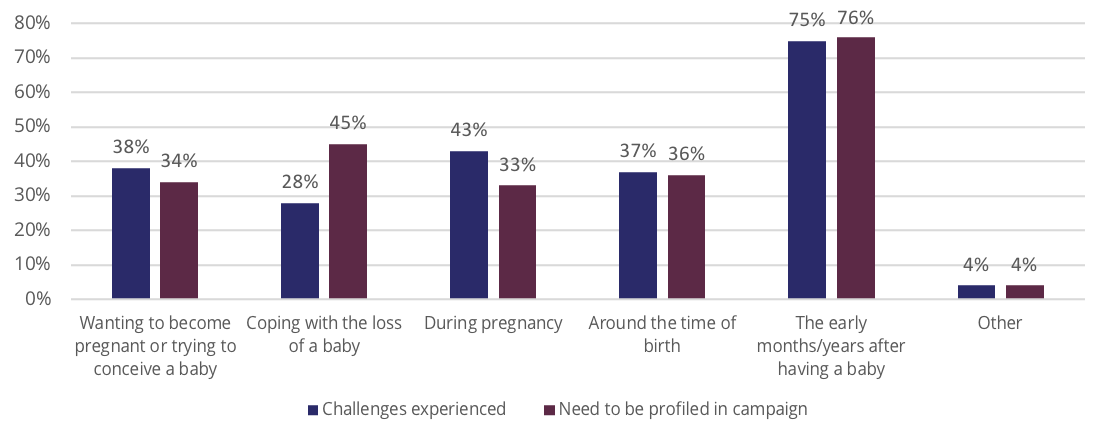Postnatal anxiety and depression – what the research had to say

What the research had to say
COPE research undertaken with 1,899 consumers, revealed that 75 per cent of individuals identified the postnatal period as a challenging stage, as mental health conditions commonly arose. The most common conditions were those of postnatal anxiety and depression.
Source: Centre of Perinatal Excellence (2022) 
Below are the key themes identified pertaining to personal experiences of postnatal anxiety and depression. These themes informed the development of The Truth campaign.
Postnatal anxiety
Anxiety was experienced by many respondents. Here, they described the physical symptoms as well as mental symptoms including constant worry, intrusive thoughts and rumination.
I was anxious about everything to do with my new baby I had heart palpitations insomnia and was a pure mess”
In some instances this resulted in behaviours such as not being able to sleep, not leaving the house and constantly checking on their baby,
My anxiety had caused the most issues. It has prevented me from going out of the house, telling myself that my son will get hurt or something will happen. It stops me from sleeping at night, I tell myself someone’s going to break into the house and hurt my son, and I am constantly anxious about the future.”
In turn, the physical and psychological symptoms of anxiety greatly impacted upon their functioning as a new parent and their ability to enjoy their early parenthood experience overall.
I didn’t attach to my baby. The anxiety was crippling. I just hated it. I just had dread and a horrible sense of foreboding.
Postnatal depression
Depression in the postnatal period was a strongly represented theme.
Symptoms included feeling ‘down’, ‘depressed’, ‘exhausted’, ‘lacking motivation’ lost libido’, ‘poor appetite’ and ‘isolating themselves from others’.
(The impact was) Huge. Physically and mentally. From insomnia to not knowing what my baby needed. Not eating, not exercising. Locking myself away due to anxiety and fear. The list goes on.”
They also described the social and emotional impacts.
(It was) Frightening, horrible, lonely, lost, not connected to my baby. I couldn’t ask for help or explain as I was the one in deep depression and couldn’t. Also having people around me that loved me but didn’t want to say anything in case I took it to heart. I wish someone spoke sooner. I was very sick by the time I DIAGNOSED MYSELF and found help. A very lonely frightening process.”
In many instances, these symptoms were severe, resulting in suicidal ideation and/or thoughts of infanticide (harming their child’).
I wanted to kill myself at time, hurt myself because I got angry but still could not change my situation. Many times, I thought I would hold my baby and run to in front of a car or lie on the street wishing for a peaceful death… I did not see a bright future and my marriage was broken since then.”
Despite these symptoms being present, women described feeling dismissed by health professionals, family and friends, depriving them of the opportunity to access support and/or treatment at the time it was needed.
No one asked how I was. I got dismissed as having baby blues. While crying holding my baby in front of people no one even tried. All the women in my life expected me to buck up and carry on when I was barely holding on.”